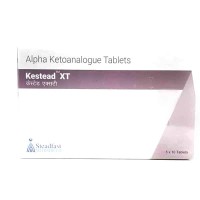Entriase tablet contain active components called Pancreatin, Calcium, and Ox bile tablets. It is indicated to ease digestion and inadequate nutrient absorption. This medication treats various conditions, including cystic fibrosis (a rare genetic disorder that causes thick mucus to build up in the lungs and other organs) and pancreatitis (pancreas inflammation). It is also used in surgical procedures involving the pancreas or gastric organs.
If you are allergic to entriase tablet or any of its ingredients, you should not take them. If you have acute pancreatitis and bile duct obstruction, you should not take it because it can worsen these conditions. This medication contains calcium, which can increase blood calcium levels. If you have hypercalcemia, you should not take this medication. It should also be used cautiously in people taking certain medications, such as anticoagulants, thiazide diuretics, and digitalis glycosides.
Entriase tablet should also be used cautiously in renal impairment and chronic pancreatitis. It is generally safe and well-tolerated in older adults. However, older adults may be more likely experience side effects like constipation and diarrhea. It is not recommended for children under the age of 6. The safety and efficacy of this medication in children under the age of 6 have not been established.
Therapeutic Effects of Entriase Tablet
Pregnancy
There is limited information on the safety of entriase tablet in pregnancy, so it is important to consult a doctor before using it.
Breast Feeding
It is important to talk to your doctor before taking any entriase tablet. It should not be used by breastfeeding women unless necessary, as there is limited information on the safety of this medication.
Lungs
If you have an entriase tablet for chronic obstructive pulmonary disease (COPD) or other lung conditions. Consult your healthcare provider before taking this medication.
Liver
People with severe liver impairment should consult a healthcare provider before taking an entriase tablet.
Alcohol
It is unsafe to drink alcohol while taking an entriase tablet as it can increase the risk of side effects, such as stomach upset and diarrhea.
Driving
Entriase tablet do not cause any drowsiness or other side effects that would impair your ability to drive. If you experience any side effects, consult your healthcare provider before taking it while driving.
Serious
- Allergic reaction
- Hypercalcemia
- Pancreatitis
- Bile duct obstruction
Common
- Nausea
- Vomiting
- Diarrhea
- Constipation
- Stomach upset
The most common side effects of entriase tablet are nausea, vomiting, diarrhea, constipation, and stomach upset. Serious side effects are rare but can include hypercalcemia (high blood calcium levels), pancreatitis (pancreas inflammation), and bile duct obstruction.
Entriase tablet should not be taken by people allergic to any ingredients, including pancreatin, calcium, or ox bile. People with acute pancreatitis, biliary obstruction, or hypercalcemia should also not take it.
Entriase tablet dosage will vary depending on the individual's needs and the condition being treated. Following the doctor's instructions carefully when taking it is important.
Entriase tablet should be taken with food to avoid stomach upset.
Entriase tablet will start working immediately after taking it with food. However, it may take several weeks or months to see the full effects of this medication, especially if you are taking it for a chronic condition.
Entriase tablet are generally safe to take long-term, but it is important to talk to your doctor about your needs and risks.
Molecule name: Pancreatin, Calcium, and Ox bile tablets | Therapeutic class: pancreatic enzyme replacement therapy (PERT) medication. |
Pharmacological class: Pancreatic enzyme replacement therapy (PERT) medication | Indications: 1. Cystic fibrosis 2. Pancreatitis 3. Surgical procedures 4. Indigestion 5. Inadequate nutrient absorption |






